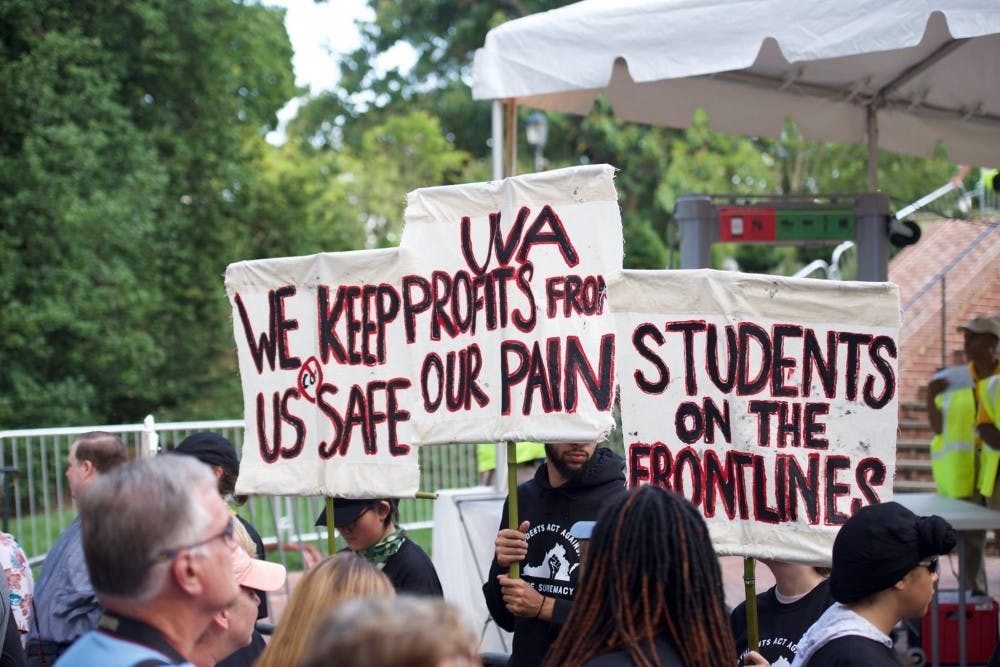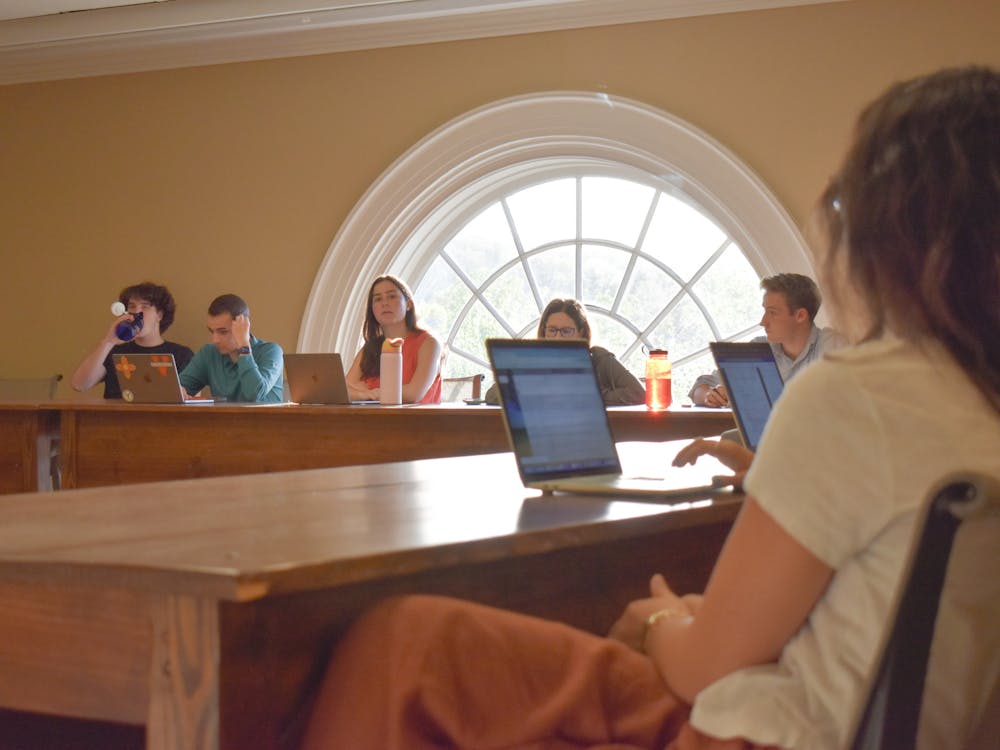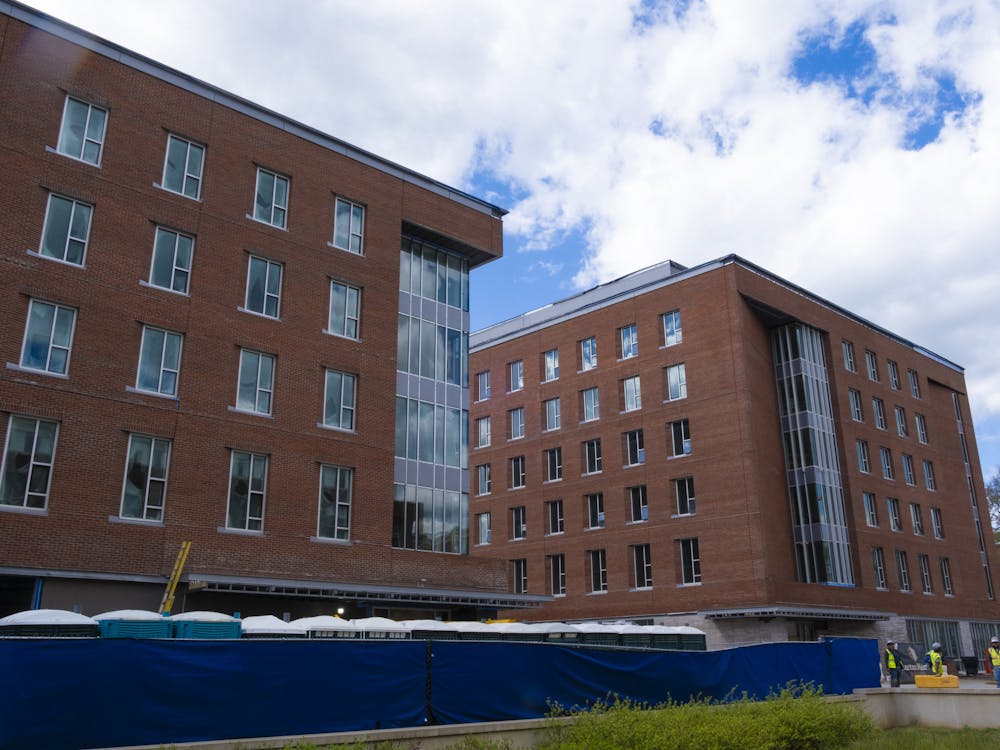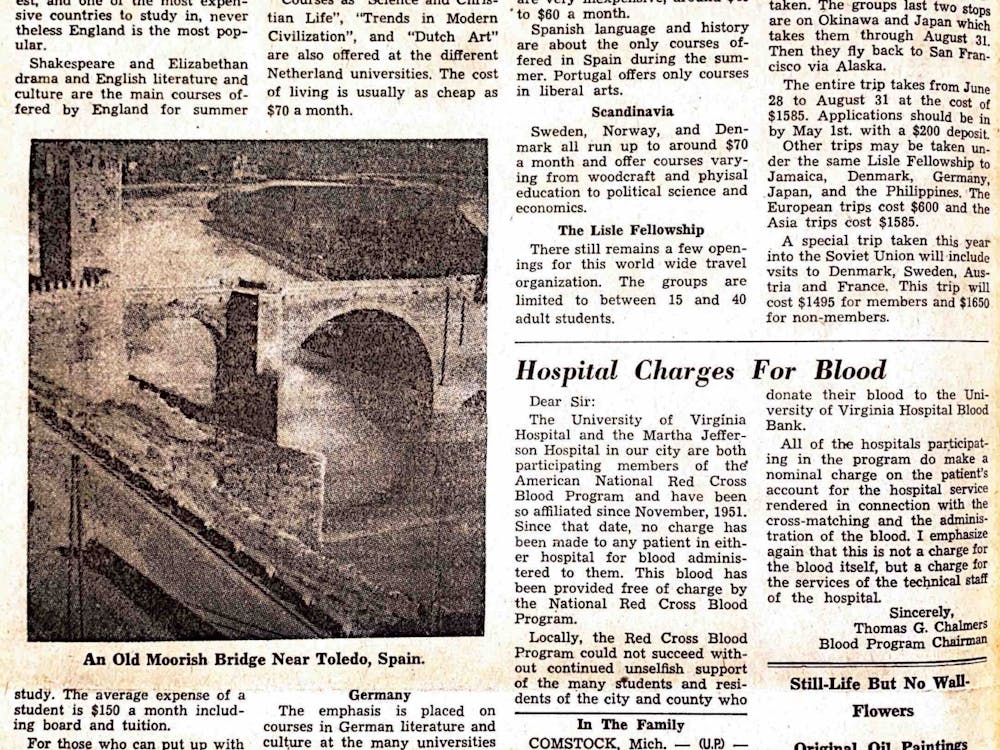One year after the white supremacist tiki-torch rally at U.Va., hundreds of people joined student activist group U.Va. Students United this past August to protest white supremacy and the heavy police presence in Charlottesville on the anniversary weekend of last summer’s violent rallies.
Before the demonstration officially began, Students United organizers passed around fliers condemning the heavy police presence in the area, which included state law enforcement personnel in full riot gear. The fliers also listed the group’s demands of the University for justice, a year after the deadly Unite the Right rally.
The group is demanding that the University pays or waives all outstanding medical bills of those injured at the white supremacist rallies last August, the University denounces white supremacy by issuing lifelong no trespassing bans for all white supremacists involved in the torchlit rally last August and the University disclose any profits raised at the Concert for Charlottesville.
Demand 1: Pay all medical bills for those injured on Aug. 11 and 12
A Students United spokesperson, who declined to be named, told The Cavalier Daily the group created these demands in the aftermath of the unwanted violence in Charlottesville to inspire acts of healing and reconciliation from the University.
“If the University really cared about its students, this is what we would want them to do,” the spokesperson said.
After speaking with protesters who suffered injuries at last year’s deadly rally about the high cost of medical treatment, Students United collectively decided to try to persuade the University to cover the medical fees for those injured while protesting white supremacy in Charlottesville.
According to the Students United spokesperson, the University did not effectively warn students about dangers associated with the impending rally and therefore should bear some of its costs.
“In a sense, they were putting students in harm’s way,” the spokesperson said. “The people who were on the frontlines fighting against white supremacy were the ones who had to pay back this huge amount of money and the cost of stress to figure out how to pay for the huge medical fees that have fallen behind their back.”
Students United says there are members of the community who are still impacted by the burden of medical fees, and did not receive any consolation or reparation from the University.
University Spokesperson Anthony de Bruyn told The Cavalier Daily in an email that the Charlottesville Patient Support Fund, established by the U.Va. Health Foundation, received $20,340 in private donations to support those injured that weekend. These funds were fully expended to cover the patient out-of-pocket expenses after insurance paid for care received Aug. 11 and 12 at U.Va. Health System and Sentara Martha Jefferson Hospital, he noted.
De Bruyn added that while the relief funds covered some of the patient balances, some patients had outstanding bills — but the Medical Center staff decided to drop the remaining patient balances.
“U.Va. Health System waived more than $39,000 of patient responsibility for care received August 11 and 12,” de Bruyn said. “All of the funds were used to cover any money owed by these patients that was not covered by insurance for services received on August 11 and 12.”
Patients impacted during the weekend who were treated by other University providers, such as U.Va. Imaging, may have been solicited for payment because the billing process is outside of the Medical Center’s control, he added. The Medical Center staff has intervened to waive those fees as well.
“Patients who needed follow-up treatment after August 12 would likely have incurred additional medical expenses,” de Bruyn said. “We referred all of those treated and identified at UVA Medical Center and Sentara Martha Jefferson on August 11 and 12 to other community-based resources for additional financial support, including the Victim/Witness Assistance Program and the Unity Cville Victim Relief/Heal Charlottesville funds.”
But fourth-year College student Natalie Romero — a counter-protester who sustained a skull fracture and other wounds in the car attack on Aug. 12, 2017 — said the University did not pay any of her medical bills.
In an email to The Cavalier Daily, Romero said she asked representatives of the Deans Working Group for help, but it was ineffective.
“They told me that our medical bills were paid for by the benefit concert,” Romero wrote. “I told them this was not true and they also promised to look into it... and nothing! That money has not been given to victims. Why not waive them with all that endowment money?”
Romero, who paid for her medical treatment out of pocket, is still recovering from the effects of the car attack.
“The physical trauma has healed nicely, but the emotional trauma seems to never end,” Romero said. “I took last semester off and did a lot of emotional healing and self-realizations, but to be honest, this summer opened up a lot of scars that I thought were healed. That's the crazy part about trauma — it can pop right back up. The sounds of cars driving past me scare me. When I am a passenger in a car and a car turns near us my heart freezes. This whole campus is re traumatizing. I see torches in front of Clark, next to the amphitheater, South Lawn, Rotunda ... When my phone vibrates more than once at night I'm afraid it's another threatening phone call.”
Demand 2: Issue trespass warnings to white supremacists
U.Va. Students United’s second demand called on the University to issue lifelong “trespass warnings” to the hundreds of white supremacists who marched across Grounds and on the Lawn chanting messages of hate and racism on Aug. 11 last year, effectively banning them from Grounds.
“For the trespassing, we saw that as something the University could actually have done — to actually denounce white supremacy,” the spokesperson said. “It would send a message to the community and the people that the University is on their side.”
The University issued a no-trespass warning to Jason Kessler, a white nationalist and organizer of the “Unite the Right” rally, in late April which prohibits him from entering University property for four years. Kessler had appeared twice at the U.Va. Law Library and was met with protesters — one of whom was arrested for trespassing.
The Commonwealth of Virginia, which includes the University, also banned white nationalist Christopher Cantwell for five years after he plead guilty to assaulting two counter protesters during last year’s rally.
“We are in support of it,” the Students United spokesperson said. “We wanted a no trespassing ban, but we also want a lifelong no trespassing ban,” emphasizing that U.Va.’s trespass warnings expire after four years.
Under University policy, a trespass warning is issued by the University Police Department Chief of Police for violations of Virginia criminal codes or University regulations. The UPD can also create trespass warnings for individuals deemed to have engaged in “conduct that threatens the health, safety, or property” of a University community member.
University Communications did not respond for comment on whether the University has considered issuing lifelong no-trespass orders to the other identified white supremacists.
Demand 3: Disclose Concert for Charlottesville profits
U.Va. Students United’s last demand to the University is to disclose all profits raised at last September’s Concert for Charlottesville, which featured musical acts from Justin Timberlake, Ariana Grande, Coldplay and more. The Dave Matthews Band organized the event to raise funds for the victims injured at the “Unite the Right” rally.
The Students United spokesperson said they are unaware of how the donations raised from the concert are being utilized and who is in control of it, saying the process has been opaque.
Although tickets to the concert were free, those who attended the concert were encouraged to donate to the “Concert for Charlottesville Fund,” which is housed at the Charlottesville Area Community Foundation. While the University hosted the concert and is listed as a co-sponsor, the CACF collected the contributions.
These funds were intended to provide “direct assistance to survivors, trauma counseling services for the broader community, targeted investment in the Jewish community, and grants to address structural racism and its impacts,” according to the CACF.
The foundation says that $1.4 million were raised in the Concert for Charlottesville Fund through a combination of merchandise sales, fan donations and individual corporate contributions. More than 3,000 community members, University alumni and businesses from around the world contributed to the fund.
Brennan Gould, president and CEO of CACF, said the money raised from the Concert for Charlottesville Fund was used to cover living expenses, child care and medical treatments not covered by insurance for those injured on Aug. 11 and 12.
“The funds have been a last resort for many survivors and we’ve kept them as flexible as possible to support individual recoveries,” Gould said in an email statement. “Funding has covered medical expenses, but largely the requests to the fund have been for housing, transportation, childcare and needs that other sources of support do not cover.”
Of the funds from CACF, $300,000 have been distributed “to help individuals fill gaps where they have expenses due to injury and loss of income,” the foundation says. Seven percent of the distributed funds, approximately $21,000, were used to cover medical expenses, and approximately $123,000 were used to cover housing costs.
Going forward
In a public address to students and community members on Aug. 11, University President Jim Ryan offered an apology to counter-protesters who were attacked by white supremacists near the Jefferson statue last August.
“We do nothing more than recognize our common humanity to say to those who were attacked around the statue last year — I am sorry,” Ryan said. “We are sorry.”
The U.Va. Students United spokesperson said the group wanted the University to apologize, and appreciated Ryan’s apology on the one-year anniversary of the violent march. Still, Students United does not think their demands have been met.
“The University has not asked the people who were there [on Aug. 11 and 12] for forgiveness,” the spokesperson said. “The University has not been transparent with us in terms of the money, and they haven’t given back the money to pay for medical fees … Our demands have not been met by the University of Virginia.”
Students United could not comment on any future plans to meet with University administration.
“We don’t know if we’ll be meeting with the administration to discuss the demands because the University left us behind when we tried to have our rally and when we told the University our plan and told them that we don’t want this amount of police presence at our rally, what we got was police in riot gears,” the spokesperson said. “We don’t even know if we can trust this administration at this time. But again, we’ll figure that out when the time comes.”
Romero, also a member of Students United, said she supports the demands and what the group has been fighting for.
“[U.Va. Students United] has been my village at UVA,” Romero said. “They were at court hearings with me. They were the ones holding my hands during the hearings and wiping my tears. They were next to me at doctors appointments, and driving me to meetings, and helping me recover.”





